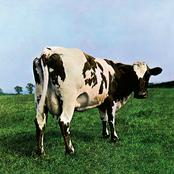Atom Heart Mother

Biography
Atom Heart Mother is the fifth studio album by Pink Floyd, released in 1970 by Harvest and EMI Records in the United Kingdom and Harvest and Capitol in the United States. It was recorded at Abbey Road Studios, London, England, and reached number 1 in the United Kingdom, and number 55 in the United States charts, and went gold in the U.S. in March 1994. A re-mastered CD was released in 1994 in the UK, and in 1995 in the U.S. The original album cover shows a cow standing in a pasture with no text...
Atom Heart Mother is the fifth studio album by Pink Floyd, released in 1970 by Harvest and EMI Records in the United Kingdom and Harvest and Capitol in the United States. It was recorded at Abbey Road Studios, London, England, and reached number 1 in the United Kingdom, and number 55 in the United States charts, and went gold in the U.S. in March 1994. A re-mastered CD was released in 1994 in the UK, and in 1995 in the U.S. The original album cover shows a cow standing in a pasture with no text nor any other clue as to what might be on the record. (Some later editions have the title and artist name added to the cover.) This concept was the group's reaction to the psychedelic space rock imagery associated with Pink Floyd at the time of the album's release; the band wanted to explore all sorts of music without being limited to a particular image or style of performance. They thus requested that their new album have "something plain" on the cover, which ended up being the image of the cow. Storm Thorgerson, inspired by Andy Warhol's famous "cow-wallpaper," has said that he simply drove out into a rural area near Potters Bar and photographed the first cow he saw. The cow's owner identified her name as "Lulubelle III." More cows appear on the back cover (again, with no text or titles), and on the inside gatefold. The title track was to have been called "The Amazing Pudding", though Ron Geesin's original score referred to it as "Epic". Its name was changed after Geesin—who co-wrote the piece and arranged the orchestration on the recording—pointed to a copy of The Evening Standard (dated Thursday 16 July 1970), and suggested to Roger Waters that he would find a title in there. The headline was: "ATOM HEART MOTHER NAMED". The piece is a progression from Pink Floyd's earlier instrumental pieces such as "A Saucerful of Secrets". The "Atom Heart Mother" suite takes up all of side one, and is split into six parts, featuring a full brass section and choir which take most of the lead melody lines, while Pink Floyd mainly provide the backing tracks; a reverse of the 1960s pop music practice of using orchestration as the background, and putting the rock band in front. However, there is one section where a bluesy electric guitar solo by David Gilmour takes the lead. Critical reaction to the suite has always been mixed, and all band members have expressed negativity toward it in recent times, as shown in the quotes section later in this article. But they appear to have been enthusiastic about the suite in the early 1970s, taking a full brass section and choir on tour just for the purpose of performing this piece; a move which caused the tour to lose money. A later arrangement without brass or choir, and pared down from 25 minutes to 15 by omitting the strange "collage" sections and closing reprise of the main theme, remained in their live repertoire into 1972, performed in concerts that also previewed The Dark Side of the Moon. Side two opens with three five-minute songs: one by each of the band's three resident songwriters, and closes with a suite with sound effects primarily conceived by Nick Mason, but credited to the whole group (and based mostly on musical ideas by Gilmour). Therefore, this album's concept is similar to their previous Ummagumma album, in that it features the full band in the first half, and focuses on individual members in the second half. Roger Waters contributes a folk ballad called "If" which he would play frequently at live shows in support of his Radio KAOS album, more than a decade later. This is followed by Rick Wright's brass-heavy "Summer '68", a critique of the "rock 'n' roll" lifestyle that would soon become characteristic of Pink Floyd. Next is David Gilmour's "Fat Old Sun", for which a 15 minute extended arrangement spent two years as a key part of the band's live set, and is a staple of Gilmour's various solo tours. The final track, "Alan's Psychedelic Breakfast", is divided into three segments, each with its own descriptive title, joined by dialogue and sound effects of then-roadie Alan Stiles preparing, discussing, and eating breakfast. The original LP ends with the sound of a dripping tap which continues into the inner groove, and thus plays on indefinitely. The album cover appears in Stanley Kubrick's film A Clockwork Orange. It is viewable on a shelf in the music shop scene. Read more on Last.fm. User-contributed text is available under the Creative Commons By-SA License; additional terms may apply.

